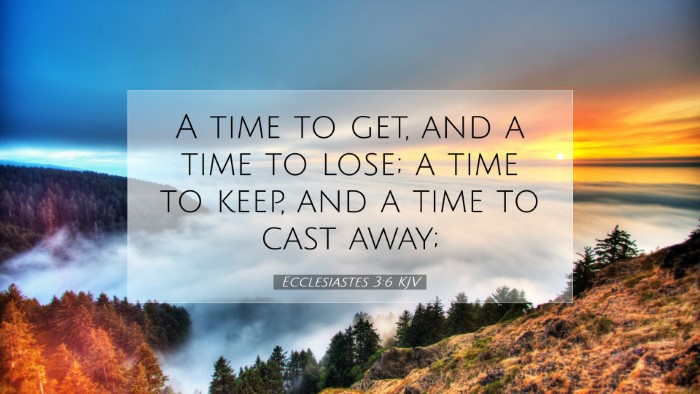Commentary on Ecclesiastes 3:6
Verse: "A time to get, and a time to lose; a time to keep, and a time to cast away."
Introduction
The book of Ecclesiastes, traditionally attributed to Solomon, grapples with the meaning of life and the temporal nature of existence. Ecclesiastes 3:6 serves as a profound reflection on the cycles of gain and loss that characterize human experience.
Contextual Overview
The third chapter of Ecclesiastes outlines the concept of a divinely ordered time for every activity under heaven. This verse summarizes the tension between acquisition and relinquishment, emphasizing the temporality of both possession and the act of letting go.
Insights from Commentaries
Matthew Henry's Commentary
Matthew Henry emphasizes the oppositional pairs presented in this verse, reflecting the dualities of life. He suggests that while there is a 'time to get,' which signifies acquisition and the necessity of resourcefulness, there is also a 'time to lose,' acknowledging the inevitable circumstances where what is gained must also be forfeited. He posits that this balance is crucial to understanding the transient nature of worldly possessions.
Albert Barnes' Notes on the Bible
Albert Barnes elaborates on the verse by discussing how this dichotomy manifests in the life of believers. He points out that 'a time to keep' signifies the wise stewardship of resources, while 'a time to cast away' illustrates the call to detach from materialism. Barnes asserts that this is not merely about physical possessions but also relates to emotional and spiritual aspects of life; there are times when holding on, as well as letting go, requires discernment filled with divine wisdom.
Adam Clarke's Commentary
Adam Clarke provides a rich exploration of the implications of this verse. He highlights the importance of timing in human endeavors. Clarke argues that the phrases 'to get' and 'to lose' denote more than just material wealth, but encompass relationships, opportunities, and spiritual growth. He encourages believers to live with the awareness that both acquisition and loss are under God’s sovereign rule, expanding their understanding of divine providence in life’s seasons.
Theological Reflections
The theological implications of Ecclesiastes 3:6 extend beyond mere pragmatism. It invites believers to consider their priorities and values in the context of eternity. The cyclical nature of gaining and losing prompts an examination of what is truly valuable in life. Are we investing in the eternal or merely accumulating earthly treasures?
The Nature of Time
The verse raises important questions about the nature of time and human existence. Our understanding of time must be informed by the belief that God is sovereign over all temporal matters. Each moment is imbued with purpose and dictated by God's divine timeline.
The Role of Human Agency
While it highlights the divine orchestration of life, the verse also underscores human agency. Recognizing when it is appropriate to gain or lose is crucial for living a life reflective of Christian values. This necessitates wisdom, discernment, and sensitivity to the Holy Spirit's leading.
Practical Applications
For pastors, theologians, and students, adapting the truths of Ecclesiastes 3:6 to contemporary life is essential. Here are some practical applications:
- Stewardship of Resources: Acknowledge the importance of wise financial stewardship, using resources in ways that reflect God’s priorities.
- Emotional Health: Understand the necessity of letting go of past hurts or relationships that no longer honor God, fostering emotional healing and growth.
- Temporal Perspective: Live with an eternal mindset, deliberately making choices that influence both personal and communal spiritual journeys.
- Community Engagement: Educate congregations on the balance of acquisition and benevolence, encouraging charity and generosity.
Conclusion
Ecclesiastes 3:6 invites a deep reflection on human experiences, urging individuals to engage with both the blessings of gaining and the pains of losing. In navigating these seasons, believers are called to remember God’s sovereign timing in all matters of life, cultivating a posture of gratitude and wisdom as they move through the complexities of existence.


